-
 Bitcoin
Bitcoin $84,650.6039
1.12% -
 Ethereum
Ethereum $1,598.2028
1.34% -
 Tether USDt
Tether USDt $0.9997
-0.03% -
 XRP
XRP $2.1078
1.77% -
 BNB
BNB $587.8170
1.08% -
 Solana
Solana $133.8641
6.87% -
 USDC
USDC $1.0002
0.01% -
 TRON
TRON $0.2474
-2.42% -
 Dogecoin
Dogecoin $0.1566
2.47% -
 Cardano
Cardano $0.6212
2.83% -
 UNUS SED LEO
UNUS SED LEO $9.4611
0.96% -
 Chainlink
Chainlink $12.5054
3.10% -
 Avalanche
Avalanche $19.3976
3.15% -
 Toncoin
Toncoin $2.9605
3.61% -
 Stellar
Stellar $0.2389
1.75% -
 Shiba Inu
Shiba Inu $0.0...01186
1.92% -
 Sui
Sui $2.1056
2.04% -
 Hedera
Hedera $0.1604
2.35% -
 Bitcoin Cash
Bitcoin Cash $332.3429
4.62% -
 Polkadot
Polkadot $3.6316
3.71% -
 Litecoin
Litecoin $75.2379
1.57% -
 Hyperliquid
Hyperliquid $16.7140
10.27% -
 Dai
Dai $0.9999
-0.01% -
 Bitget Token
Bitget Token $4.3636
0.77% -
 Ethena USDe
Ethena USDe $0.9991
-0.02% -
 Pi
Pi $0.6066
0.02% -
 Monero
Monero $217.4747
0.05% -
 Uniswap
Uniswap $5.2126
1.45% -
 Pepe
Pepe $0.0...07297
2.27% -
 OKB
OKB $50.9568
-1.99%
What is DEX (decentralized exchange) and its advantages?
DEXs enhance security and privacy, allowing direct crypto trades via smart contracts, reducing risks and fees, but may face liquidity and speed issues.
Apr 07, 2025 at 10:21 pm
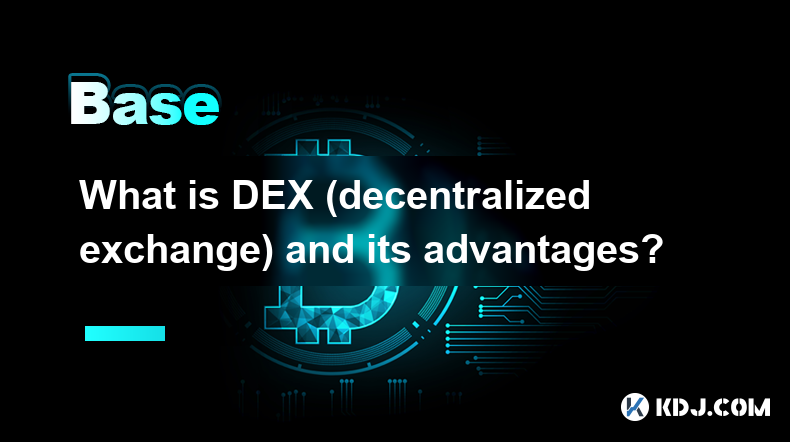
A Decentralized Exchange (DEX) is a type of cryptocurrency exchange that operates on a blockchain, allowing users to trade cryptocurrencies directly with one another without the need for an intermediary. Unlike centralized exchanges, which are operated by a single entity and often require users to deposit their funds into the exchange's wallets, DEXs enable users to retain control over their private keys and funds throughout the trading process. This fundamental difference brings several advantages to the table, which we will explore in detail.
How DEXs Work
DEXs operate using smart contracts, which are self-executing contracts with the terms of the agreement directly written into code. These smart contracts facilitate the exchange of cryptocurrencies between users. When a user wants to trade, they interact with the smart contract on the blockchain, which automatically executes the trade based on the predefined rules.
- Users initiate a trade by sending their cryptocurrency to the smart contract.
- The smart contract holds the funds in escrow until the trade conditions are met.
- Once the conditions are satisfied, the smart contract releases the funds to the respective parties.
This process ensures that trades are executed in a trustless manner, meaning users do not need to trust a third party to hold their funds.
Advantages of DEXs
Enhanced Security
One of the primary advantages of DEXs is the enhanced security they offer. Since users retain control over their private keys and funds, they are less vulnerable to hacks and thefts that often plague centralized exchanges. Centralized exchanges have been targets of significant hacks, resulting in the loss of millions of dollars worth of cryptocurrencies. DEXs mitigate this risk by ensuring that users' funds are never held in a centralized wallet.
Privacy and Anonymity
DEXs also provide a higher level of privacy and anonymity. When using a centralized exchange, users often need to go through a Know Your Customer (KYC) process, which requires them to submit personal information. DEXs, on the other hand, typically do not require such information, allowing users to trade more anonymously. This can be particularly appealing to those who value their privacy or live in regions with strict financial regulations.
Reduced Counterparty Risk
Another significant advantage of DEXs is the reduced counterparty risk. In a centralized exchange, users must trust the exchange to hold their funds securely and execute trades fairly. If the exchange goes bankrupt or engages in fraudulent activities, users could lose their funds. DEXs eliminate this risk by allowing users to trade directly with one another, with the smart contract acting as the intermediary.
Global Accessibility
DEXs offer global accessibility, enabling users from around the world to participate in trading without the need for a centralized authority. This is particularly beneficial for users in countries with restrictive financial regulations or those who do not have access to traditional banking services. As long as users have an internet connection and a compatible wallet, they can engage in trading on a DEX.
Lower Fees
Many DEXs also offer lower fees compared to centralized exchanges. Since DEXs do not require the same level of infrastructure and operational costs as centralized exchanges, they can often provide more competitive fee structures. This can result in significant savings for frequent traders.
Examples of Popular DEXs
To better understand how DEXs function in practice, let's look at a few popular examples:
- Uniswap: Uniswap is one of the most well-known DEXs operating on the Ethereum blockchain. It uses an automated market maker (AMM) model, where users can trade tokens directly from their wallets without the need for an order book.
- SushiSwap: SushiSwap is a fork of Uniswap that offers additional features such as yield farming and staking. It also operates on the Ethereum blockchain and uses an AMM model.
- PancakeSwap: PancakeSwap is a DEX on the Binance Smart Chain, offering lower transaction fees compared to Ethereum-based DEXs. It also features yield farming and staking options.
How to Use a DEX
Using a DEX can be a straightforward process, but it does require some familiarity with cryptocurrency wallets and blockchain technology. Here's a step-by-step guide on how to use a DEX like Uniswap:
- Connect Your Wallet: First, you need to connect your cryptocurrency wallet to the DEX. Most DEXs support popular wallets like MetaMask. Open your wallet and navigate to the DEX's website, then click on the "Connect Wallet" button and follow the prompts to connect your wallet.
- Select Tokens: Once your wallet is connected, you can select the tokens you want to trade. Choose the token you want to swap from and the token you want to receive.
- Enter Amount: Enter the amount of the token you want to swap. The DEX will automatically calculate the amount of the token you will receive based on the current market rate.
- Review and Confirm: Review the transaction details, including the amount of tokens you will receive and the transaction fee. If everything looks correct, click on the "Swap" button to confirm the transaction.
- Wait for Confirmation: The transaction will be sent to the blockchain for processing. Once the transaction is confirmed, the swapped tokens will be sent to your wallet.
Potential Drawbacks of DEXs
While DEXs offer numerous advantages, they are not without their drawbacks. It's important to consider these potential downsides before deciding to use a DEX:
- Liquidity Issues: DEXs often have lower liquidity compared to centralized exchanges, which can result in higher slippage and less favorable trading conditions.
- User Experience: The user experience on DEXs can be less intuitive than on centralized exchanges, requiring users to have a certain level of technical knowledge.
- Transaction Speed: Transactions on DEXs can be slower due to the need for blockchain confirmation, which can be a disadvantage for traders looking for quick trades.
Frequently Asked Questions
Q: Can I trade any cryptocurrency on a DEX?
A: Not all cryptocurrencies are available on every DEX. The availability of tokens depends on the specific DEX and the blockchain it operates on. For example, Uniswap primarily supports tokens on the Ethereum blockchain, while PancakeSwap focuses on tokens on the Binance Smart Chain.
Q: Are DEXs regulated?
A: DEXs are generally less regulated than centralized exchanges because they do not hold users' funds and operate on decentralized networks. However, the regulatory landscape for DEXs is evolving, and some jurisdictions may impose certain requirements or restrictions.
Q: How do I ensure the security of my funds on a DEX?
A: To ensure the security of your funds on a DEX, always use a reputable wallet and never share your private keys. Additionally, be cautious of phishing attempts and only interact with the official DEX website. Regularly updating your wallet software and using strong, unique passwords can also enhance security.
Q: Can I use a DEX on my mobile device?
A: Yes, many DEXs offer mobile-friendly interfaces or have dedicated mobile apps. For example, you can use MetaMask on your mobile device to connect to DEXs like Uniswap and perform trades on the go.
Disclaimer:info@kdj.com
The information provided is not trading advice. kdj.com does not assume any responsibility for any investments made based on the information provided in this article. Cryptocurrencies are highly volatile and it is highly recommended that you invest with caution after thorough research!
If you believe that the content used on this website infringes your copyright, please contact us immediately (info@kdj.com) and we will delete it promptly.
- SUI holds firm at $2 as wedge breakout nears
- 2025-04-17 21:15:12
- Dawgz AI ($DAGZ) Shows Strong Presale Momentum, Targeting Breakout Potential After Launch
- 2025-04-17 21:15:12
- Amazon Web Services (AWS) Outage Freezes Cryptocurrency Withdrawals on Binance, KuCoin, and MEXC
- 2025-04-17 21:10:13
- Introducing Initia (INIT) to Binance Launchpool
- 2025-04-17 21:10:13
- How Much Could 2,500 ONDO Tokens Make You by the End of 2025?
- 2025-04-17 21:05:14
- Bitcoin (BTC) Infrastructure Developer Lombard Finance Launches One-Click Staking SDK
- 2025-04-17 21:05:14
Related knowledge
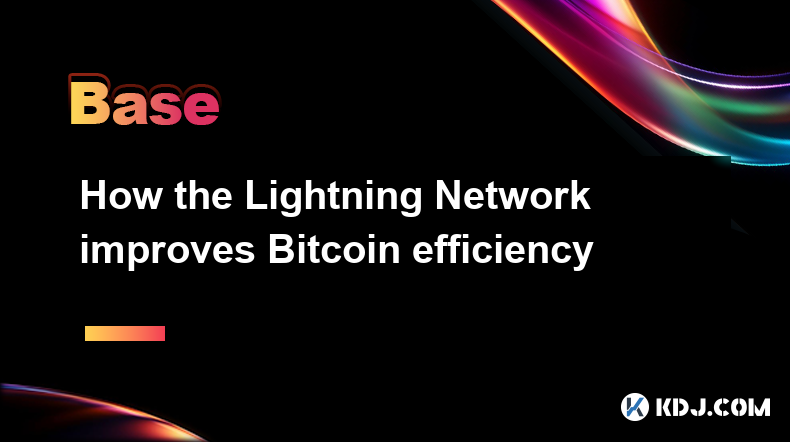
How the Lightning Network improves Bitcoin efficiency
Apr 17,2025 at 08:56pm
The Lightning Network represents a significant advancement in the Bitcoin ecosystem, aiming to address some of the most pressing issues related to transaction speed and cost. By enabling off-chain transactions, the Lightning Network drastically improves Bitcoin's efficiency, allowing for faster and cheaper transactions. This article will explore how the...

Analysis of the KYC process of cryptocurrency exchanges
Apr 17,2025 at 05:07pm
The Know Your Customer (KYC) process is a critical component in the operations of cryptocurrency exchanges. It serves as a regulatory measure to prevent fraud, money laundering, and other illicit activities. KYC procedures are designed to verify the identity of users and ensure compliance with financial regulations. This article delves into the various ...

What does Floor Price mean in the NFT market
Apr 17,2025 at 12:42am
The term Floor Price is a critical concept within the NFT (Non-Fungible Token) market, serving as a key indicator for both buyers and sellers. In essence, the floor price represents the lowest price at which an NFT from a particular collection is currently listed for sale on a marketplace. This price point is crucial for understanding the perceived valu...
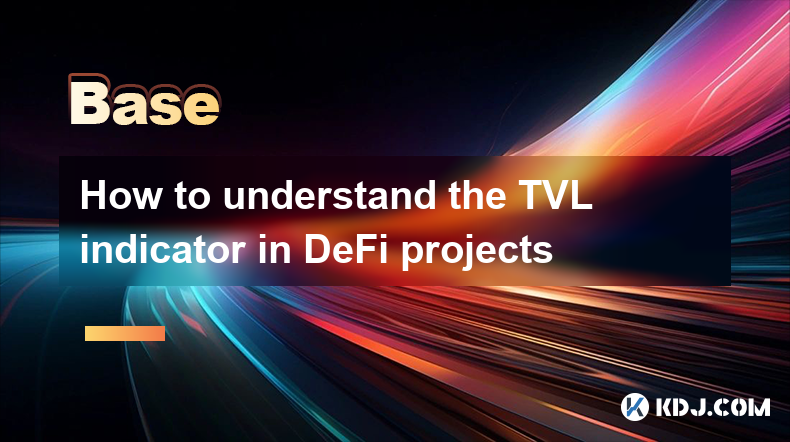
How to understand the TVL indicator in DeFi projects
Apr 17,2025 at 03:28pm
Understanding the TVL indicator in DeFi projects is crucial for investors and enthusiasts looking to gauge the health and popularity of decentralized finance platforms. TVL, or Total Value Locked, represents the total amount of assets that are currently staked or locked in a DeFi protocol. This metric serves as a barometer for the trust and interest tha...
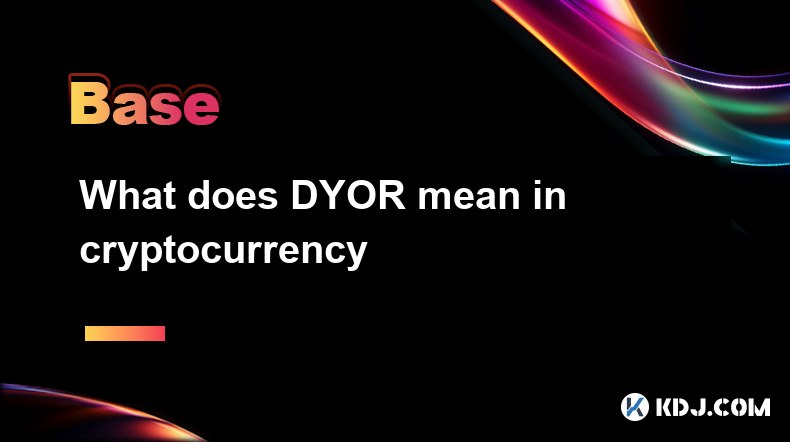
What does DYOR mean in cryptocurrency
Apr 17,2025 at 03:00pm
DYOR, or 'Do Your Own Research,' is a crucial mantra in the cryptocurrency community. It emphasizes the importance of individuals conducting their own thorough investigations before making any investment decisions. In the fast-paced and often volatile world of cryptocurrencies, relying solely on others' advice or the hype surrounding a particular coin c...
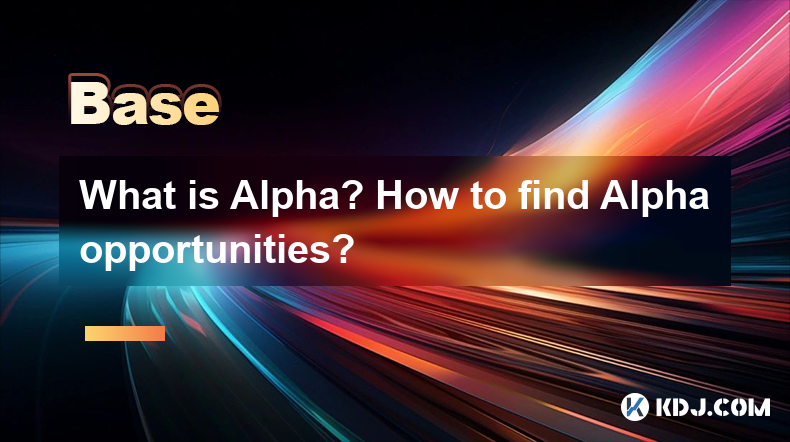
What is Alpha? How to find Alpha opportunities?
Apr 16,2025 at 12:42pm
What is Alpha?Alpha is a term widely used in the financial world, including the cryptocurrency market, to describe the ability of an investment to outperform a benchmark. In the context of cryptocurrencies, alpha refers to the excess return an investor achieves over the market's average return. For example, if the overall crypto market grows by 10% in a...

How the Lightning Network improves Bitcoin efficiency
Apr 17,2025 at 08:56pm
The Lightning Network represents a significant advancement in the Bitcoin ecosystem, aiming to address some of the most pressing issues related to transaction speed and cost. By enabling off-chain transactions, the Lightning Network drastically improves Bitcoin's efficiency, allowing for faster and cheaper transactions. This article will explore how the...

Analysis of the KYC process of cryptocurrency exchanges
Apr 17,2025 at 05:07pm
The Know Your Customer (KYC) process is a critical component in the operations of cryptocurrency exchanges. It serves as a regulatory measure to prevent fraud, money laundering, and other illicit activities. KYC procedures are designed to verify the identity of users and ensure compliance with financial regulations. This article delves into the various ...

What does Floor Price mean in the NFT market
Apr 17,2025 at 12:42am
The term Floor Price is a critical concept within the NFT (Non-Fungible Token) market, serving as a key indicator for both buyers and sellers. In essence, the floor price represents the lowest price at which an NFT from a particular collection is currently listed for sale on a marketplace. This price point is crucial for understanding the perceived valu...

How to understand the TVL indicator in DeFi projects
Apr 17,2025 at 03:28pm
Understanding the TVL indicator in DeFi projects is crucial for investors and enthusiasts looking to gauge the health and popularity of decentralized finance platforms. TVL, or Total Value Locked, represents the total amount of assets that are currently staked or locked in a DeFi protocol. This metric serves as a barometer for the trust and interest tha...

What does DYOR mean in cryptocurrency
Apr 17,2025 at 03:00pm
DYOR, or 'Do Your Own Research,' is a crucial mantra in the cryptocurrency community. It emphasizes the importance of individuals conducting their own thorough investigations before making any investment decisions. In the fast-paced and often volatile world of cryptocurrencies, relying solely on others' advice or the hype surrounding a particular coin c...

What is Alpha? How to find Alpha opportunities?
Apr 16,2025 at 12:42pm
What is Alpha?Alpha is a term widely used in the financial world, including the cryptocurrency market, to describe the ability of an investment to outperform a benchmark. In the context of cryptocurrencies, alpha refers to the excess return an investor achieves over the market's average return. For example, if the overall crypto market grows by 10% in a...
See all articles























































































